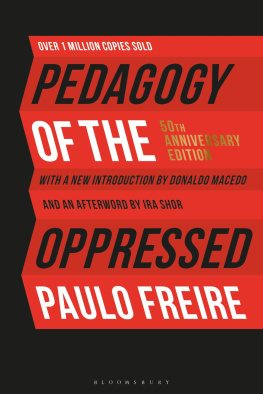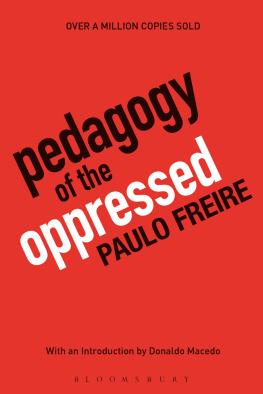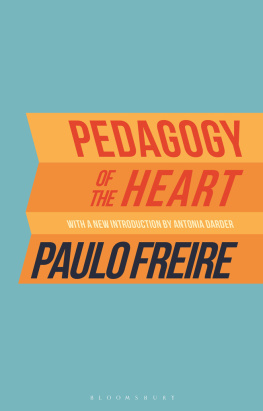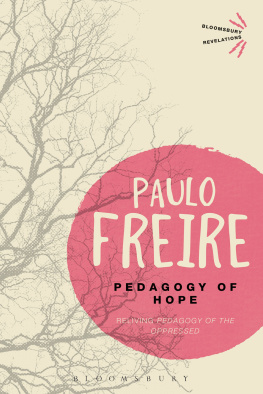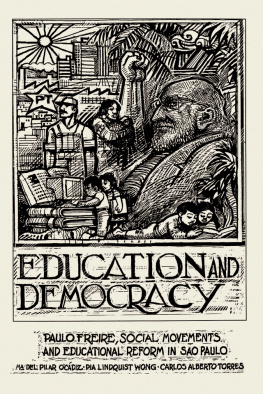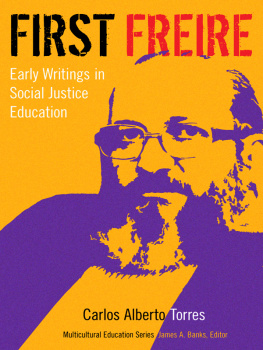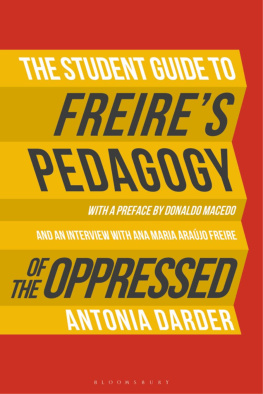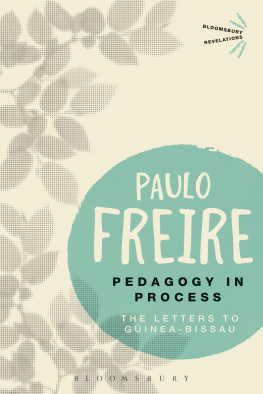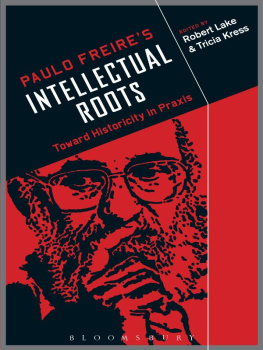Paulo Freire - Pedagogy of the Oppressed: 50th Anniversary Edition
Here you can read online Paulo Freire - Pedagogy of the Oppressed: 50th Anniversary Edition full text of the book (entire story) in english for free. Download pdf and epub, get meaning, cover and reviews about this ebook. year: 2018, publisher: Bloomsbury, genre: Politics. Description of the work, (preface) as well as reviews are available. Best literature library LitArk.com created for fans of good reading and offers a wide selection of genres:
Romance novel
Science fiction
Adventure
Detective
Science
History
Home and family
Prose
Art
Politics
Computer
Non-fiction
Religion
Business
Children
Humor
Choose a favorite category and find really read worthwhile books. Enjoy immersion in the world of imagination, feel the emotions of the characters or learn something new for yourself, make an fascinating discovery.
- Book:Pedagogy of the Oppressed: 50th Anniversary Edition
- Author:
- Publisher:Bloomsbury
- Genre:
- Year:2018
- Rating:4 / 5
- Favourites:Add to favourites
- Your mark:
- 80
- 1
- 2
- 3
- 4
- 5
Pedagogy of the Oppressed: 50th Anniversary Edition: summary, description and annotation
We offer to read an annotation, description, summary or preface (depends on what the author of the book "Pedagogy of the Oppressed: 50th Anniversary Edition" wrote himself). If you haven't found the necessary information about the book — write in the comments, we will try to find it.
Pedagogy of the Oppressed: 50th Anniversary Edition — read online for free the complete book (whole text) full work
Below is the text of the book, divided by pages. System saving the place of the last page read, allows you to conveniently read the book "Pedagogy of the Oppressed: 50th Anniversary Edition" online for free, without having to search again every time where you left off. Put a bookmark, and you can go to the page where you finished reading at any time.
Font size:
Interval:
Bookmark:

Pedagogy of the Oppressed
Also available from Bloomsbury
Education for Critical Consciousness , Paulo Freire
Pedagogy in Process , Paulo Freire
Pedagogy of Hope , Paulo Freire
Pedagogy of the City , Paulo Freire
Pedagogy of the Heart , Paulo Freire
The Student Guide to Freires Pedagogy of the Oppressed , Antonia Darder
A Pedagogy of Faith , Irwin Leopando
Paulo Freire , Daniel Schugurensky
Paulo Freires Intellectual Roots , Robert Lake and Tricia Kress
Bloomsbury Critical Education series (series editor: Peter Mayo)
Pedagogy, Politics and Philosophy of Peace , Carmel Borg and Michael Grech
Critical Human Rights, Citizenship, and Democracy Education , Michalinos Zembylas and Andr Keet
Critical Pedagogy Today series (series editors: Shirley R. Steinberg and Ana Maria Arajo Freire)
On Critical Pedagogy , Henry A. Giroux
Critical Pedagogy for Social Justice , John Smyth
Echoes from Freire for a Critically Engaged Pedagogy , Peter Mayo
Critical Narrative as Pedagogy , Ivor Goodson and Scherto Gill
Teaching as the Practice of Wisdom , David Geoffrey Smith
To the oppressed,
and to those who suffer with them
and fight at their side
Pedagogy of the Oppressed 50th Anniversary Edition
Paulo Freire
Translated by Myra Bergman Ramos
With an Introduction by Donaldo Macedo and an Afterword by Ira Shor

Contents
The justification for a pedagogy of the oppressed; the contradiction between the oppressors and the oppressed, and how it is overcome; oppression and the oppressors; oppression and the oppressed; liberation: not a gift, not a self-achievement, but a mutual process
The banking concept of education as an instrument of oppressionits presuppositionsa critique; the problem-posing concept of education as an instrument for liberationits presuppositions; the banking concept and the teacher-student contradiction; the problem-posing concept and the supersedence of the teacher-student contradiction; education: a mutual process, world-mediated; people as uncompleted beings, conscious of their incompletion, and their attempt to be more fully human
Dialogicsthe essence of education as the practice of freedom; dialogics and dialogue; dialogue and the search for program content; the human-world relationship, generative themes, and the program content of education as the practice of freedom; the investigation of generative themes and its methodology; the awakening of critical consciousness through investigation of generative themes; the various stages of the investigation
Antidialogics and dialogics as matrices of opposing theories of cultural action: the former as an instrument of oppression and the latter as an instrument of liberation; the theory of antidialogical action and its characteristics: conquest, divide and rule, manipulation, and cultural invasion; the theory of dialogical action and its characteristics: cooperation, unity, organization, and cultural synthesis
A day after New York City came up with a $1,000 bagel, a local restaurateur unveiled a $27,000 chocolate sundae... setting a Guinness world record for the most expensive dessert.
Reuters Business News, November 7, 2007
It is indeed an honor to write the introduction to Paulo Freires Pedagogy of the Oppressed , a book that is unquestionably a classic as it has, throughout this last half century, become increasingly more relevant as the twenty-first century ushers the world into a very dark new age. Leading intellectuals such as Noam Chomsky, Zygmunt Bauman, Henry Giroux, Arundhati Roy, Amy Goodman, Thomas Piketty, among others, have wisely and incessantly alerted people around the world of the dire consequences (i.e., denial of climate change, obscene economic inequality, potential nuclear catastrophe) of the far-right power hegemony that, if left unchecked, may potentially result in the end of humanity as we know it. Thus, not only must an alternative political course be taken, but central to its agenda must also be the development of peoples critical awareness of how they are in the world and with the worlda posture that Freire insisted upon and which informed his brilliant and insightful ideals in Pedagogy of the Oppressed. That is to say, Freires major goal in Pedagogy of the Oppressed was not to propose an innovative methodology (which would be antithetical to his critique of formulaic models of education) but to launch the development of an emancipatory pedagogical process that invites and challenges students, through critical literacies, to learn how to negotiate the world in which they find themselves, in a thoughtful and critically reflective manner, so as to expose and engage the tensions and contradictions inherent in the ongoing relations between the oppressor and the oppressed. Thus, the central goal of Freires Pedagogy of the Oppressed is to awaken in the oppressed the knowledge, creativity, and constant critical reflective capacities necessary to unveil, demystify, and understand the power relations responsible for their oppressed marginalization and, through this recognition, begin a project of liberation through praxis which, invariably, requires consistent, never-ending critical reflection and action. Currently, while more and more educators are embracing Freire, many of them, including some liberal and progressives, allow their critical discourse to be betrayed by a lack of coherence between their denouncement of oppressive conditions and their accommodation to dominant structures that created these oppressive structures in the first place, a point to which I will return later.
Approximately a month or so before Paulo Freires untimely death on May 2, 1997, he and I were walking on New Yorks Fifth Avenue, discussing the obvious contradictions of New York Citys opulence that makes it possible for people to flaunt their wealth, for instance, paying $27,000 for a chocolate sundae in luxurious restaurants amid thousands and thousands of homeless people, including families with children who sleep in cars, under bridges, and in overcrowded shelters. The unpacking of these contradictions was to be the major goal of a course that Freire and I were contracted to co-teach at the Harvard Graduate School of Education in fall 1997. We had agreed that we would invite students into a critical dialogue about bodies of knowledges not usually emphasized in the academy such as ethics, the substantivity of democracy beyond the four-year-of-the-carnivalesque voting cycle (as we have recently witnessed with Donald Trumps successful campaign for the presidency), and a rigorous study of ideology and its role in reading the word and the world. During our walk along Fifth Avenue, Freire would frequently ask me if we could stop so he could more emphatically make his points and share his concerns regarding the destructive and oppressive forces of neoliberalism in developed and developing countries. Frequently, we would lean against the wall of imposing buildings to avoid the usual frantic torrent of hurried people who, in a dizzying way, wanted to forge ahead of the other pedestrians, those perhaps who, on occasion, may have slowed down a bit to satisfy their consumerist curiosity at the unending and seductive store window displays of fashion and the latest technological gadgetsa hallmark of an obsessively consumerist societya society where money is the measure of all things, and profit the primarily goal. For the oppressors, what is worthwhile is to have morealways moreeven at the cost of the oppressed having less or having nothing. For them, to be is to have... (p. 58). In retrospect, I now realize that Freires frequent requests to stop had more to do with the fatigue he was experiencing due to his heart conditionan ailment that he very much kept to himself and about which he seldom complained.
Font size:
Interval:
Bookmark:
Similar books «Pedagogy of the Oppressed: 50th Anniversary Edition»
Look at similar books to Pedagogy of the Oppressed: 50th Anniversary Edition. We have selected literature similar in name and meaning in the hope of providing readers with more options to find new, interesting, not yet read works.
Discussion, reviews of the book Pedagogy of the Oppressed: 50th Anniversary Edition and just readers' own opinions. Leave your comments, write what you think about the work, its meaning or the main characters. Specify what exactly you liked and what you didn't like, and why you think so.

